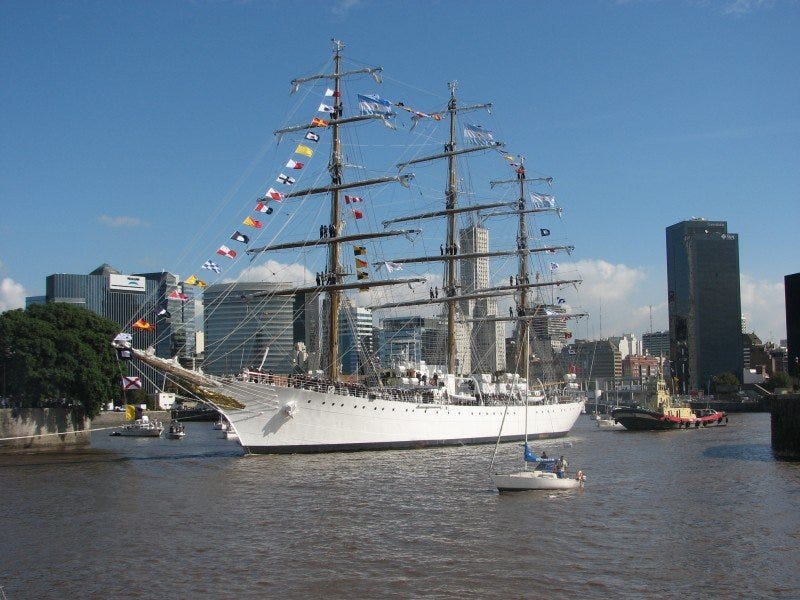That time a hedge fund stole a naval vessel
A story good enough for a bond movie (he he he)
The ARA Libertad (pictured above) is a symbol of Argentina. One of the fastest and largest tall ships in the world, the Libertad sails the world and is a key component of Argentine soft power. It's not a true fighting vessel, in that it’s an old school sailing ship not meant for combat, but it is still part of the Argentine Navy. The Libertad even took part in the United States' 1976 Bicentennial by sailing up the Hudson River. So yes, the Libertad is a point of pride for Argentinians. And in 2012, the Libertad was impounded by the Ghanaian government at the behest of an American hedge fund. That's right; a North American company asked a court in Africa to impound a South American naval vessel, and it actually happened.
Let’s take a step back.
Countries issue debt. Usually, this debt takes the form of a bond. Bonds are simple financial instruments. If someone buys a $10,000 20-year treasury bond at 5% interest, the buyer (bondholder) gives the bond issuer $10,000 today, the bond issuer pays the bondholder $500 a year for twenty years in interest, and then after 20 years the bond reaches maturity and the issuer must pay the bondholder back the $10,000 principal. A bondholder can also decide to sell the bond to someone else before maturity is reached, and then the bond issuer must pay the new bondholder $500 per year and $10,000 when the bond reaches maturity.
Bonds are a simple and relatively safe way to invest money. Bonds are an IOU that pays a steady amount, so they don't fluctuate in value like a stock, which is a share of ownership in a company. The main risk to owning a bond is that the bond issuer can always default and not pay back some or all of the interest or principal owed. For example, when Detroit declared bankruptcy in 2013, some bondholders were paid $0.74 on the dollar instead of the full value.
Of course, if a bond issuer declares bankruptcy and says that will only pay 74 cents on the dollar, bondholders don’t have to take the deal. They could also hold on to their bonds and sue in court, hoping to get all the money they are owed, or at least more than the bond issuer is offering. This is what happened when Argentina defaulted on its debt in 2001. It offered around 30 cents on the dollar to bondholders, and eventually, around 93% of them agreed to take some sort of deal. The remaining 7%, however, held out. Some sold their bonds to a vulture fund named NML Capital, a Cayman Islands-based subsidiary of the West Palm Beach company Elliott Management. Basically, NML Capital is the bond villain (he he he again).
NML Capital sued in US court, arguing that the Argentine government needed to pay its debt in full. Argentina, naturally, disagreed. Normally, when a company or person defaults on its debts, lenders will sue and take some of the defaulter’s assets. When a person defaults on their mortgage, the bank forecloses on their house. Or, in a delightful turnaround, when a bank doesn’t pay money owed to a person, the person can foreclose on the bank. Repossession of individuals and businesses is relatively straightforward. But how does one repossess a country? Embassies are off-limits, and countries will take steps to protect other assets if they are under threat. What asset could a country repossess?
Enter the ARA Libertad.
NML capital found out that the Libertad would be in Ghana, so they sued in Ghanaian court and tried to repossess the vessel. For reasons that probably aren't totally above board, the Ghanaian court impounded the Libertad and threatened to seize the ship and turn it over to NML capital. Argentina was understandably furious. The pride and joy of their navy had just been impounded! The president of Argentina, Cristina Fernández de Kirchner (and bond girl) said, “As long as I’m president, you can take our frigate, but nobody is going to take the liberty, the sovereignty and dignity of this nation”. There were accusations of capitalism run amok, neo-colonialism, the whole shebang.
The end of the story is also surprising. The Ghanaian government revoked the court order impounding the Libertad as the seizure of the ship clearly violated maritime law. The ship sailed back to Argentina, where it was met with a hero's welcome. NML Capital continued to press its case through the legal system, and in 2016 agreed to a deal with Argentina in which it was paid around 75% of the value of the bonds.
To recap. A Cayman Island-based vulture fund, which was itself a subsidiary of a Florida hedge fund, sued in Ghanaian court and successfully impounded an Argentine naval vessel. Globalization at work.



If only Argentina agreed to pay a fixed amount of their pesos, and then paid in 2016 after the inflation!